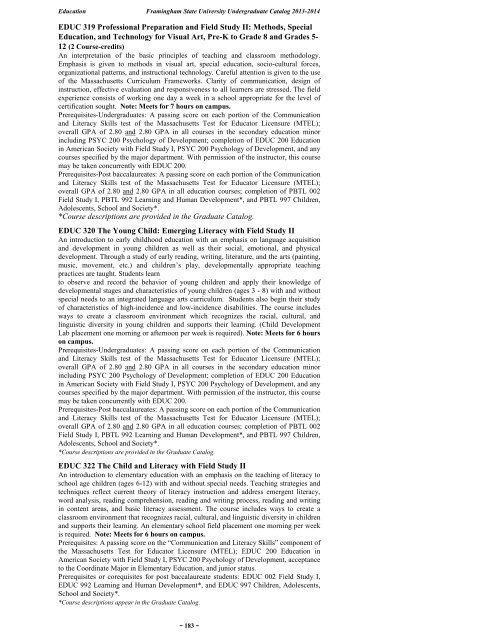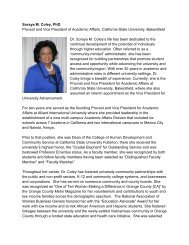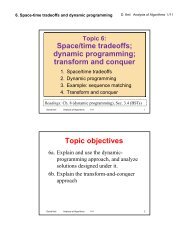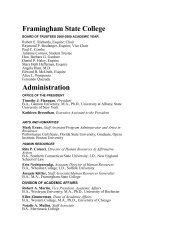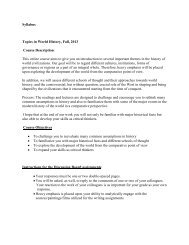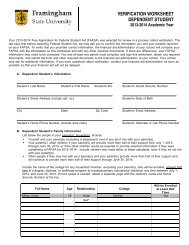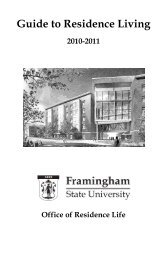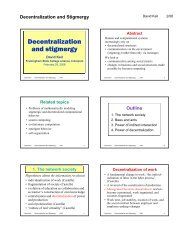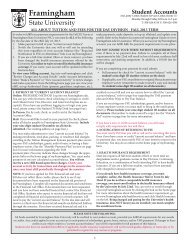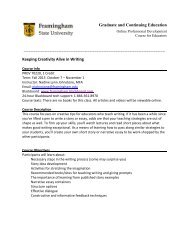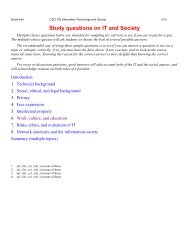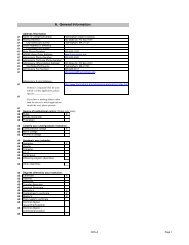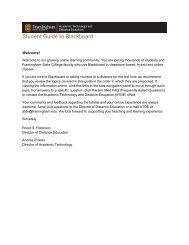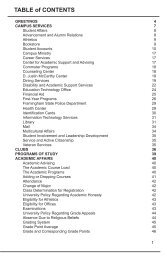EDUCATION COURSE DESCRIPTIONS - Framingham State ...
EDUCATION COURSE DESCRIPTIONS - Framingham State ...
EDUCATION COURSE DESCRIPTIONS - Framingham State ...
Create successful ePaper yourself
Turn your PDF publications into a flip-book with our unique Google optimized e-Paper software.
Education <strong>Framingham</strong> <strong>State</strong> University Undergraduate Catalog 2013-2014<br />
EDUC 319 Professional Preparation and Field Study II: Methods, Special<br />
Education, and Technology for Visual Art, Pre-K to Grade 8 and Grades 5-<br />
12 (2 Course-credits)<br />
An interpretation of the basic principles of teaching and classroom methodology.<br />
Emphasis is given to methods in visual art, special education, socio-cultural forces,<br />
organizational patterns, and instructional technology. Careful attention is given to the use<br />
of the Massachusetts Curriculum Frameworks. Clarity of communication, design of<br />
instruction, effective evaluation and responsiveness to all learners are stressed. The field<br />
experience consists of working one day a week in a school appropriate for the level of<br />
certification sought. Note: Meets for 7 hours on campus.<br />
Prerequisites-Undergraduates: A passing score on each portion of the Communication<br />
and Literacy Skills test of the Massachusetts Test for Educator Licensure (MTEL);<br />
overall GPA of 2.80 and 2.80 GPA in all courses in the secondary education minor<br />
including PSYC 200 Psychology of Development; completion of EDUC 200 Education<br />
in American Society with Field Study I, PSYC 200 Psychology of Development, and any<br />
courses specified by the major department. With permission of the instructor, this course<br />
may be taken concurrently with EDUC 200.<br />
Prerequisites-Post baccalaureates: A passing score on each portion of the Communication<br />
and Literacy Skills test of the Massachusetts Test for Educator Licensure (MTEL);<br />
overall GPA of 2.80 and 2.80 GPA in all education courses; completion of PBTL 002<br />
Field Study I, PBTL 992 Learning and Human Development*, and PBTL 997 Children,<br />
Adolescents, School and Society*.<br />
*Course descriptions are provided in the Graduate Catalog.<br />
EDUC 320 The Young Child: Emerging Literacy with Field Study II<br />
An introduction to early childhood education with an emphasis on language acquisition<br />
and development in young children as well as their social, emotional, and physical<br />
development. Through a study of early reading, writing, literature, and the arts (painting,<br />
music, movement, etc.) and children’s play, developmentally appropriate teaching<br />
practices are taught. Students learn<br />
to observe and record the behavior of young children and apply their knowledge of<br />
developmental stages and characteristics of young children (ages 3 - 8) with and without<br />
special needs to an integrated language arts curriculum. Students also begin their study<br />
of characteristics of high-incidence and low-incidence disabilities. The course includes<br />
ways to create a classroom environment which recognizes the racial, cultural, and<br />
linguistic diversity in young children and supports their learning. (Child Development<br />
Lab placement one morning or afternoon per week is required). Note: Meets for 6 hours<br />
on campus.<br />
Prerequisites-Undergraduates: A passing score on each portion of the Communication<br />
and Literacy Skills test of the Massachusetts Test for Educator Licensure (MTEL);<br />
overall GPA of 2.80 and 2.80 GPA in all courses in the secondary education minor<br />
including PSYC 200 Psychology of Development; completion of EDUC 200 Education<br />
in American Society with Field Study I, PSYC 200 Psychology of Development, and any<br />
courses specified by the major department. With permission of the instructor, this course<br />
may be taken concurrently with EDUC 200.<br />
Prerequisites-Post baccalaureates: A passing score on each portion of the Communication<br />
and Literacy Skills test of the Massachusetts Test for Educator Licensure (MTEL);<br />
overall GPA of 2.80 and 2.80 GPA in all education courses; completion of PBTL 002<br />
Field Study I, PBTL 992 Learning and Human Development*, and PBTL 997 Children,<br />
Adolescents, School and Society*.<br />
*Course descriptions are provided in the Graduate Catalog.<br />
EDUC 322 The Child and Literacy with Field Study II<br />
An introduction to elementary education with an emphasis on the teaching of literacy to<br />
school age children (ages 6-12) with and without special needs. Teaching strategies and<br />
techniques reflect current theory of literacy instruction and address emergent literacy,<br />
word analysis, reading comprehension, reading and writing process, reading and writing<br />
in content areas, and basic literacy assessment. The course includes ways to create a<br />
classroom environment that recognizes racial, cultural, and linguistic diversity in children<br />
and supports their learning. An elementary school field placement one morning per week<br />
is required. Note: Meets for 6 hours on campus.<br />
Prerequisites: A passing score on the “Communication and Literacy Skills” component of<br />
the Massachusetts Test for Educator Licensure (MTEL); EDUC 200 Education in<br />
American Society with Field Study I, PSYC 200 Psychology of Development, acceptance<br />
to the Coordinate Major in Elementary Education, and junior status.<br />
Prerequisites or corequisites for post baccalaureate students: EDUC 002 Field Study I,<br />
EDUC 992 Learning and Human Development*, and EDUC 997 Children, Adolescents,<br />
School and Society*.<br />
*Course descriptions appear in the Graduate Catalog.<br />
~ 183 ~


